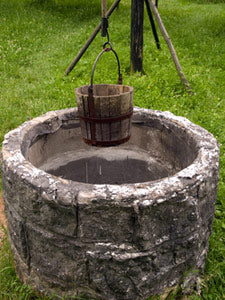
If your well water gives off a strong rotten egg smell you most likely have a problem with hydrogen sulfide gas in your water supply. Hydrogen sulfide gas is produced when sulfur-bacteria breaks down sulfur compounds and this process can be found in groundwater, water distribution systems and water heaters. This form of bacteria has the ability to turn sulfate and organic matter such as vegetation into foul smelling hydrogen sulfide gas particularly in warm environments. Sulfur bacteria produce slime which can help other bacteria grow, such as iron bacteria. The slime can clog wells, plumbing, and irrigation systems. Below, we discuss several methods you can use to determine the level of your contamination and how to best treat it correctly.
Follow Your Nose to Determine the Source
The first thing to remember is not to panic. Hydrogen sulfide gas in drinking water is mostly a nuisance and its presence does not pose a health risk despite the noxiously bad odors and taste they cause in your water. The odors are very strong and can be detected at very low levels therefore it is important that you start by trying to determine the source of the problem. First check the smell of the water coming out of both the cold and hot faucets at a sink by turning them on (one at a time) and letting it run a few minutes. If the odors can only be found in the hot water the main source of the problem is possibly due to the water heater. If running the water a few minutes removes the smell, then the cause of the odor is in the plumbing which means water chlorination may be needed.
Try the same experiment at other faucets to see if you also detect the odor. The presence of the odor at only certain sinks could mean that the source is somewhere in the drains, fixtures or pipes and not the water. If this is the case, a simple sink disinfection and flushing procedure may be able to remove the odors. If you can detect the odors at every faucet, then the source is most likely the water itself which means a hydrogen sulfide and UV filter would be recommended. Regardless of the source of the odors, installing whole house water filters that will remove hydrogen sulfide and kill sulfur bacteria is a good solution to consider if you want to reduce bad smells, and protect your family from other chemical and microbial contaminants.
Take Back Your Water and Just Breathe!
There are two main filtration methods available for removing hydrogen sulfide from water which includes using different variations of activated carbon and manganese dioxide media to treat the water.
-
Activated Carbon
Activated carbon is an effective option when the amount of hydrogen sulfide in the water is low, around 1ppm. The gas is basically adsorbed and trapped into the pores of the carbon, thus removing it from the water. When higher levels of the gas are present, a manganese dioxide based filtration system is the better choice.
-
Manganese Dioxide
Manganese dioxide is a compound that occurs naturally as the mineral pyrolusite and it is used in water filtration systems to remove hydrogen sulfide by oxidizing and converting the gas to tiny particles of sulfur that can then be trapped inside the filter. This high-purity media is also highly effective at oxidizing iron, precipitating it out of the water for removal, which is why many hydrogen sulfide removal systems are also sold and marketed as iron water filters.
For people on un-sanitized well water systems, it is advisable for them to disinfect their entire water distribution system with a strong chlorine solution, a practice known as shock chlorination. Once this is done, a whole house UV (ultraviolet) light should be installed to control sulfur bacteria and prevent it from entering the home and reestablishing a colony in the water distribution channel. Installing whole house filters that will treat both sulfur bacteria and hydrogen sulfide gas is the best way to remove rotten eggs smells from your well water and to ensure that is does not reoccur in the future.



